7 Steps to Stop Self-Criticism Spirals
Sharing is caring!
There have been so many times that I’ve gotten caught in a self-criticism spiral. And it feels really scary and overwhelming. So, today I want to share 7 steps to stop self-criticism spirals.
7 Steps to Stop Self-Criticism Spirals

I’m not a medical professional. Please read my disclaimer here. I’m sharing what works for me personally in hopes that it will help someone else as well.
To start off, I want to share about where my self-criticism comes from.
Ever since I was 8 years old, I’ve been very self-critical. I’ve always had the sense that I have to be better and better.
This was the age that I got baptized, and my little kid brain thought that meant I had to be absolutely, completely perfect so that I could be a good girl and get into heaven.
Honestly, it felt as if I always had an imaginary bar that I could never really reach but that I had to always keep striving toward.
That’s a lot of pressure for a child, but that’s how I interpreted what I was going through.
As I got older, growth and constantly becoming better became a major obsession. Couple this with anxiety, and it was the perfect storm for poor mental health.
Once I was an adult, it became very difficult for me to relax and enjoy myself.
Frequently, I’d have self-criticism fueled anxiety attacks. The voice in my head would tell me I wasn’t enough and I hadn’t done enough.
If you’ve been through this, you know how awful it is.
But the good news is that it’s definitely overcome-able. And I have these attacks less and less as I work through it (yay!).
Now, I want to share with you how I have decreased these moments over time with 7 steps to stop self-criticism spirals.
#1 Identify Times You Tend To Spiral
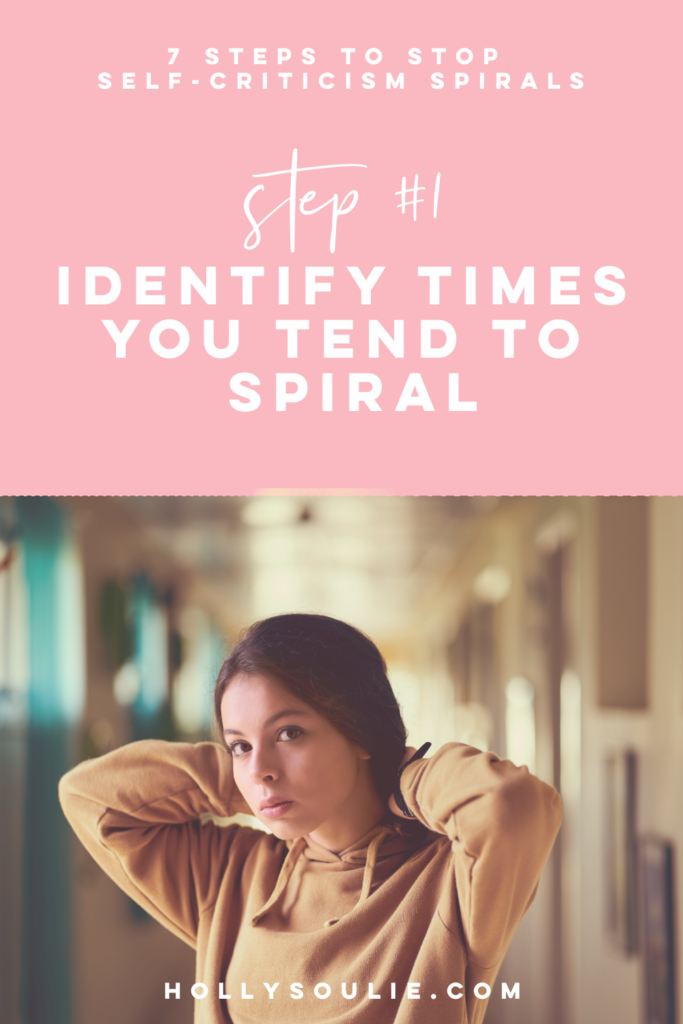
First of all, identifying the specific settings or times of day that you tend to spiral will help you see the pattern to heal it.
For me, I usually spiral when I’m trying to relax. Like on the evenings or weekends, on vacation, watching TV or spending time with my husband.
You know, those moments when you’d imagine that I would feel safe to let loose and enjoy myself.
When I start feeling bad, I look at the context I’m in. If it’s one of these times, I can say, “Yep, it makes sense I’m spiraling right now.”
From there I can start breaking it down further.
If you have frequent self-criticism spirals, take a mental inventory of where you were and what you were doing when they happened. Perhaps you could write them down to identify a pattern.
#2 Identify What It FEELS Like to Spiral
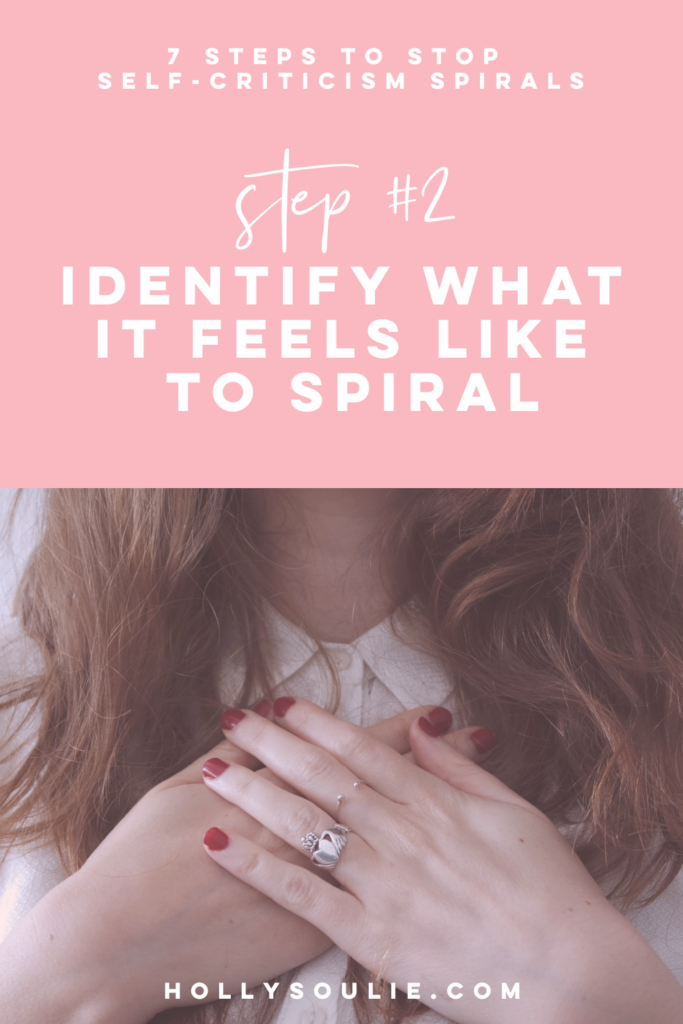
Second, start thinking about how you feel when you’re in a self-criticism spiral.
Personally, mine feel very hopeless, dark, heavy and like I’m out of control of my life. And it usually doesn’t make sense for the context.
Like I mentioned above, a spiral comes on when I’m trying to relax. So, for the context, feeling heavy and hopeless doesn’t really make sense.
For example, once I was on vacation with my husband in San Diego. Everything was going well and we were having a great time.
But then I got back to the hotel for the evening and just felt horrible. So, I started to cry and couldn’t identify WHY I was feeling so bad.
It was one of those pesky self-criticism spirals.
Eventually, I was able to calm down. But as you can see, my spiral wasn’t logical for the relaxing vacation context.
Now, I can look back and take that moment as an example for when I’m spiraling.
If you spiral out of self-criticism, identify the exact feelings you typically have when you do. Again, identifying the pattern will help you take your power back from it!
#3 Identify the Thoughts You Have When You Spiral
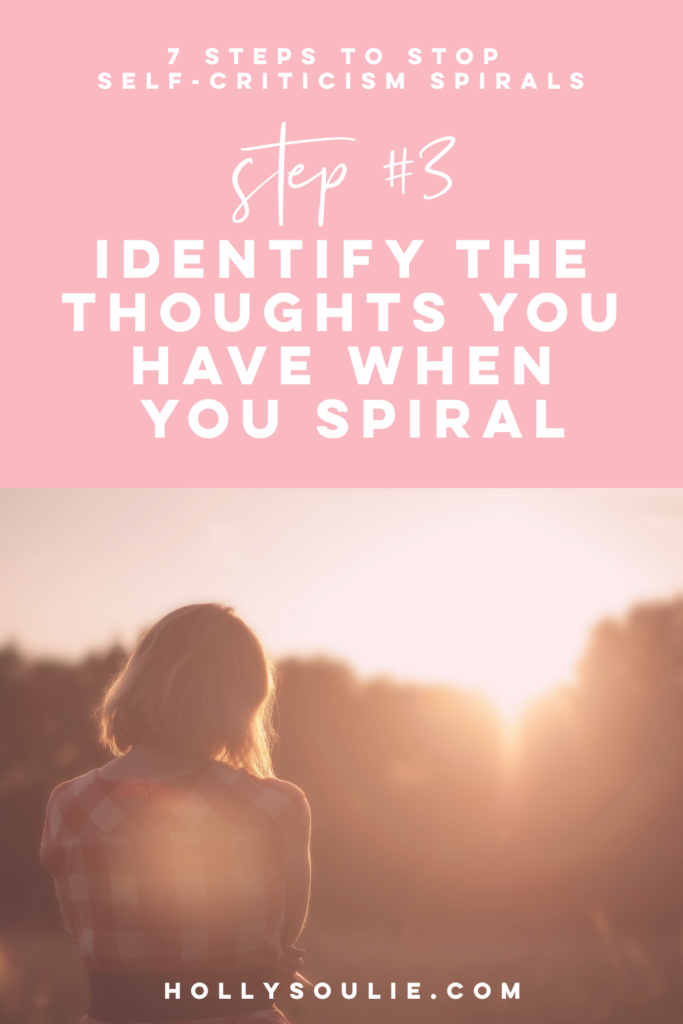
Next, take a look at the thoughts you think when you’re spiraling.
Personally, my inner voice can be pretty harsh. So, when I feel like I’m spiraling, I start paying attention to the thoughts I’m having.
My pesky brain will say things like:
You should have gotten that thing done.
You’re bad because you didn’t do that.
You’re never going to get anywhere in life.
You’re a failure.
If you want to hear how to make your inner voice nicer, I wrote a blog post about it here.
When I spiral, I’ve noticed that my self-critical thoughts tend to tell the same story: that I’m not enough. So, identifying them helps me feel like I’m more in control of the situation.
Then I can say, “I’m not feeling good enough right now. I think I’m having a self-criticism spiral.”
When you start identifying your typical spiral-y thoughts, then you’ll be able to see them as they are, which are just mean thoughts that aren’t true.
#4 Ask Yourself Why You’re Being Self-Critical

After I’ve noticed my spiral-y feelings and thoughts, I try to identify where they’re coming from.
Now, a lot of times our subconscious likes to lie and tell us that there’s no identifiable reason for why you’re feeling so bad.
But remember, this is a lie that your brain is telling you. There’s almost always a specific reason that you’re spiraling (at least for me there is).
So, start digging into your thoughts to see where they’re coming from. I wrote a blog post that might help you do that here.
For instance, last week I didn’t get something very important crossed off my to-do list. And sure enough, that evening I started spiraling.
So, I asked myself WHY I was feeling like I wasn’t enough. And it was because I didn’t do that one thing during my day.
Ugh. Ok.
My brain was acting up and telling me I wasn’t good enough because I hadn’t gotten that thing done.
And technically, it makes sense. It really was important to me that I finished that task.
But did it merit how much I was beating myself up on it? Definitely not.
When I was able to see the spiral of harsh thoughts, it was easier for me to see it and not add to it with more stressful thoughts.
#5 Talk Back to the Negative Thoughts
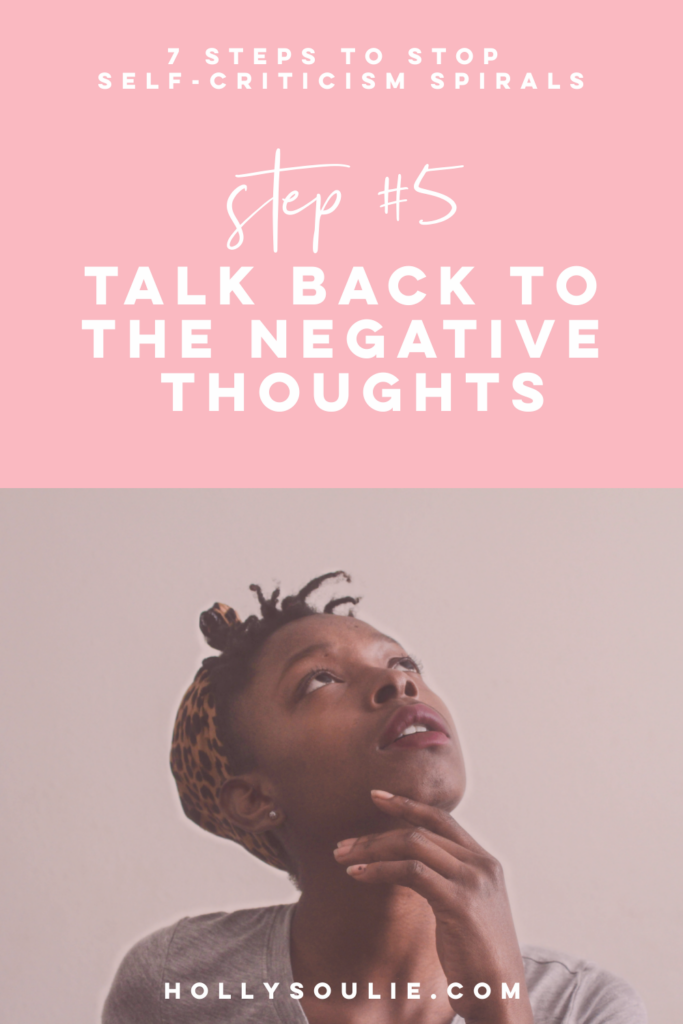
Now, you’ve identified what it FEELS like and the thoughts you have when you spiral. So it’s time to start questioning those thoughts.
For instance, when I didn’t get that task done last week and I started spiraling, I was able to pause to ask myself about it.
First, I ask myself if all my harsh thoughts are true. Is it true that I’m not enough since I didn’t get that ONE thing done?
Then comes the hard part: talking back to the critical voice.
Because honestly, it’s not true at all. Being enough as a person does not come from how productive I am, or how much I accomplish.
So, when I have these mean thoughts, I talk back to and try to take away the power from them.
I’m still worthwhile even if I didn’t get that thing done.
I still deserve to relax even if I didn’t cross everything off my list.
You’re just a silly, mean thought. I don’t deserve this.
I can get that done tomorrow, or whenever I have the energy.
I hear you! You don’t have to be so loud.
And yes, this really is the most difficult part. Because, that mean voice is actually trying to help. But when it sends you into a self-criticism anxiety spiral, then it’s no longer helpful.
So, start finding evidence that the mean voice in your head criticizing you is wrong. Then, talk directly to it when it’s being mean.
#6 Verbalize It or Talk it Out
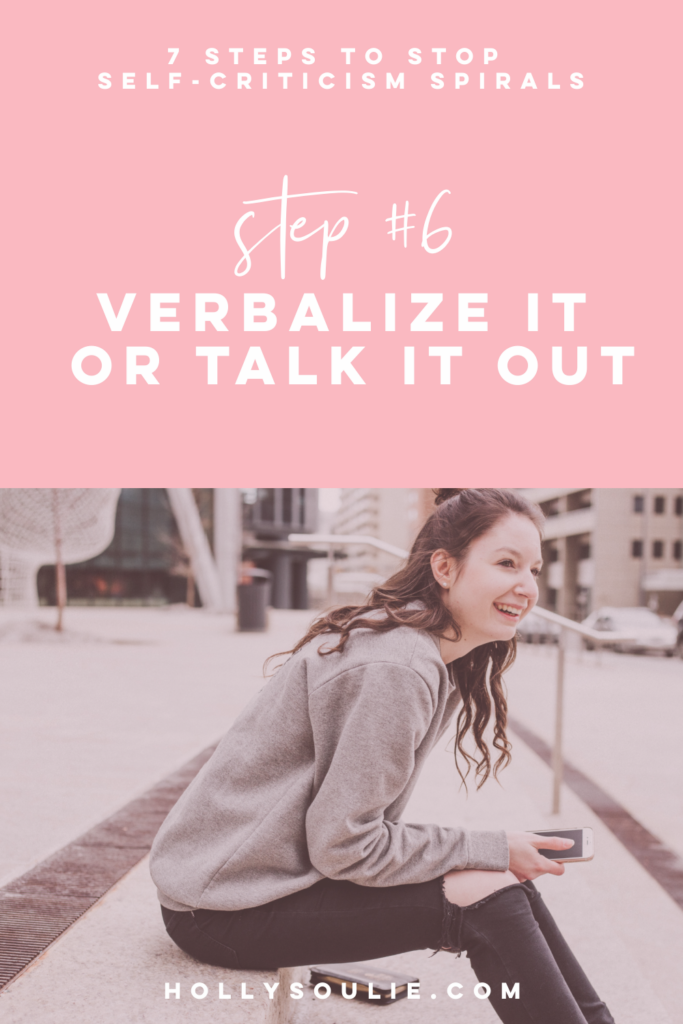
Another thing that helps me is saying these mean thoughts out loud.
Usually, the thoughts are actually so inaccurate that when you say them out loud, they sound ridiculous.
So, when I’m spiraling and say, “I’m not enough and don’t deserve to be a person because I didn’t cross that one thing off my list today,” it just sounds silly.
Now, I don’t mean to belittle what anyone is going through. Because I know that these moments can be really dark. And I’ve been to very dark places in my mind (yes, I’ve thought about suicide many times in the past. Sometimes, my mind just goes there).
But sometimes, saying the thoughts out loud that are plaguing me takes their power away, even just a little.
Or, I’ll say everything to my husband. And he’ll help talk me through.
I’ll even call a friend to just cry things out when I’m feeling absolutely horrible about myself.
If you need someone to talk to, here are a couple of numbers for people who are ready to talk.
1-800-273-8255 US Crisis Hotline
1-833-456-4566 Canada Crisis Hotline
Never be ashamed of asking for help. You deserve to have someone to talk to, especially in these hard moments.
When you can turn to a loved one or even a stranger on a mental health hotline, it can help you feel even a tiny bit better.
Remember, when you take those thoughts out of your head and say them out loud, they lose a little power.
#7 Take Action If Needed

Finally, when I’m in a self-criticism spiral, I see if there is any action that I can take.
That critical voice in your head actually has a purpose. In one way or another, it’s just trying to get you to survive, regardless of how mean it’s being.
So, when I get into a spiral I ask myself this question:
Is there any realistic action I could take that would make me feel better?
And this can be really difficult when your brain is going crazy, making you feel bad. But I’ve found that when I try to listen and understand my inner critic, that it usually has a purpose for why it’s being so critical.
Here are a few examples from my life:
- If I’m spiraling about eating unhealthy, maybe I need to be more balanced in my diet.
- If I’m spiraling about my job, maybe I need to implement more structure so I can be more efficient.
- If I’m spiraling about saying the wrong thing, maybe I need to reflect on if what I said was really so bad. And if it wasn’t maybe I need to work on forgiving myself.
While there might not always be a reason your brain is being so critical, there’s a chance that there is. So, don’t be afraid to see if there’s something constructive that your inner critic is trying to vocalize to you.
Conclusion
I’m no stranger to the self-criticism spiral, and it’s really such a painful thing to experience. But by getting to know my own spiral, I’ve actually decreased how often I experience them. And they don’t seem as scary anymore.
I truly hope you found the 7 steps to stop self-criticism spirals helpful. What do you do when your brain is being too self-critical? Tell me in the comments!
If what you read was helpful, pin it.
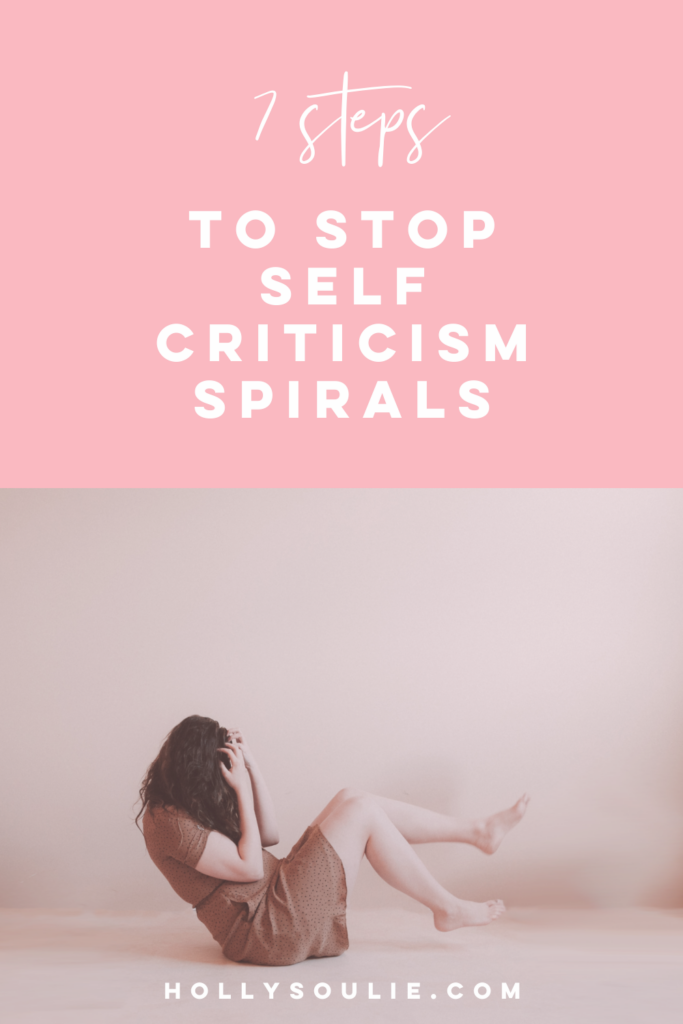
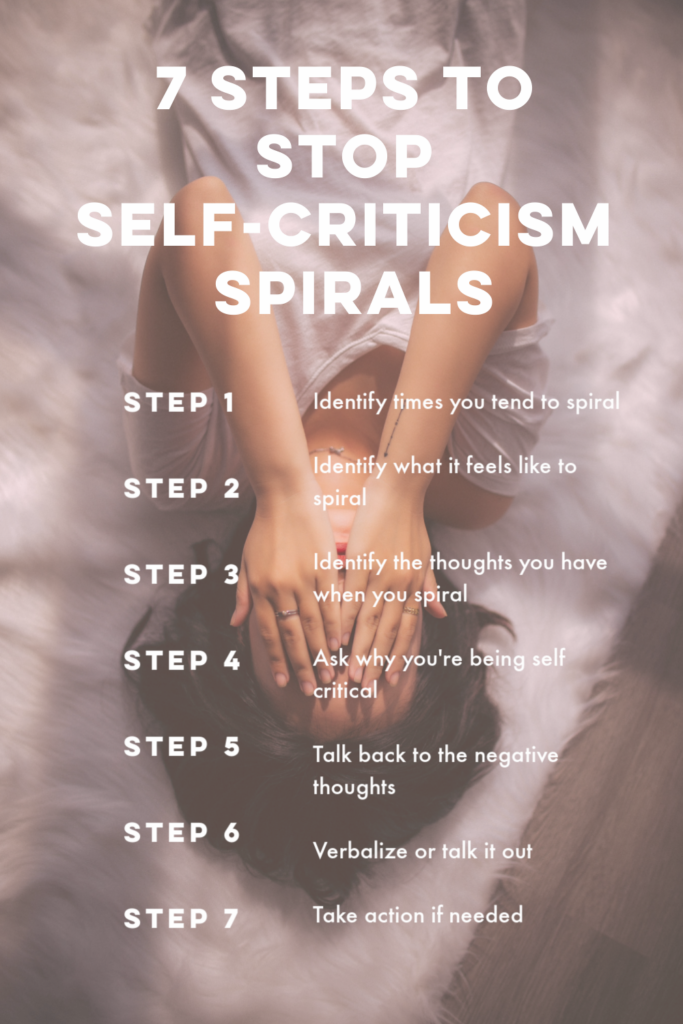
I’m an emotional fluency educator, guiding you into a more harmonious relationship with your emotions so you can move through life with clarity and calm.
